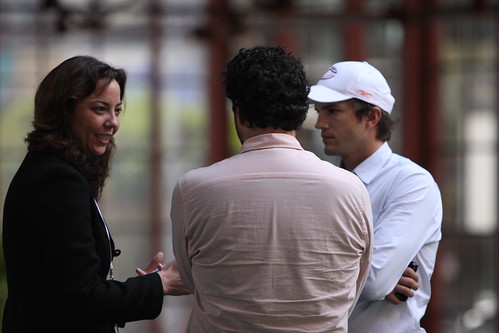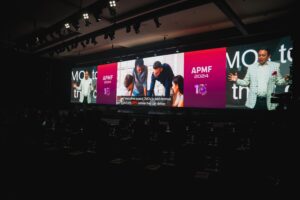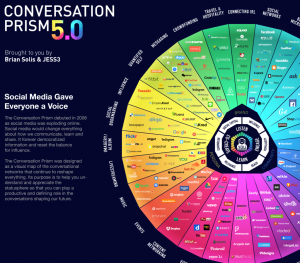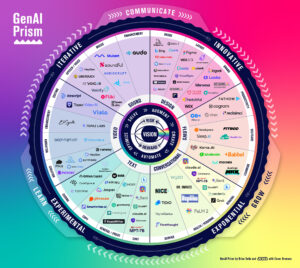
Source
Updated…
It started as a simple and seemingly harmless contest. Who would be the first person on Twitter to reach 1,000,000 followers?
This wasn’t yet another follower push open to just anyone on Twitter however, not even the Weblebrities who helped propel the popular micro community to an emerging, iconic pop culture status; it was (and at the moment, still is) a race between the world’s most visible celebrities and prominent media brands.
Ashton Kutcher, a television and movie star who’s also keenly astute and observant to the promise of new media, challenged CNN and its founder, Ted Turner to the race.
It was the match heard round the blogosphere, twitterverse and statusphere.
Shortly thereafter, Britney Spears, Will Smith and a bevy of opportunistic celebrities (and their publicists) and media properties (driven by their PR teams) followed suit. Britney’s team offered chances to win free tickets in exchange for followers. Other celebrities (who shall remain anonymous, DM’d followers to ask for help in spreading the word.)
The competition quickly became a media phenomenon.
Ashton and Twitter Co-Founder Evan Williams appeared on the Oprah show, which celebrated a new genre of media and online celebrity with almost every leading competitor surpassing 1,000,000 followers on the same day. The publicity was enough to inspire Oprah to start tweeting.

Sarah Ross, Ashton Kutcher, TechCrunch50
Initially I questioned the exchange. I couldn’t help but feel as though “we the people” on Twitter were merely viewed as pawns in a personal chess match between the elite.
Think about it. If Twitter had 6-7 million users, we’re talking about 1 in every 6 or so users following one of the contenders.
I threw the question out to Twitter, “How do you feel about the race to 1,000,000?”
The response was almost overwhelming in its volume and vigor, spanning across Twitter and Facebook over the course of several hours.
While the publicity for Twitter and the overall medium that is Social Media is incredible and sprawling, I believe that the purpose and deeper meaning of having 1,000,000 followers on Twitter or any social network, will be lost to the fervor that fuels this “contest” – unless we’re comfortable holding the title of “follower” a.k.a. social pauper. I highly doubt that any brand will view this special achievement of having cultivated 1 million followers as an opportunity to “engage” in “conversations” with their communities. Intention is easily assessable by simply viewing the latest tweets via www.twitter.com/username.
But in Ashton’s case, it’s so much deeper. I believe his intentions are genuine.
Ashton echoes the sentiment of why many of us have invested in Social Media literacy over the years, “Twitter is removing filters between celebrities and fans, big media companies and their customers.”
Now that he’s won, he’s promised to donate 10,000 mosquito nets to help fight malaria and hopefully there’s much more social good to follow. Using social media to build a platform for self-promotion or a top-down distribution channel for propaganda and messages is, in the spirit of the social web, anti-social. To demonstrate that any individual can earn influence for which to wield freely and graciously in the name of social good is symbolic of the true spirit of Social Media.
In his own words, Kutcher so passionately defines what has inspired many of us over the last several years in our work to help cultivate the foundation for social media and the very people powering its evolution, “So why is this significant? This is a huge statement for Social Media. For one person to actually have the ability to broadcast to as many people as a major media network, sort of signifies the turning of the tide from tradition news outlets to social news outlets. With our video cameras on cell phones, picture cams, blogging, twittering, posting, and Facebooking, we actually become the source of the news, the broadcasters of the news, and the consumers of the news…we have the potential on this day to turn the tide…where social media and social news outlets can become as powerful as the major news outlets. We’re doing that with the help of you. It’s sort of power to the people and I like that, a lot.”
We participate on social networks to express ourselves and share a piece of who we are in the real world, online, to forge relationships with people we respect, trust, and admire and it inspires us to share, learn, and grow together. With every tweet and update, we reveal a bit of what we stand for and what moves us, forming a unique social graph that contextually connects us to others in an irreproducible network. It’s unique to each one of us, and it’s both empowering and powerful.
We become media.
We become influencers.
We are the source of the social seismographs that spark reverberating tremors that represent the potential to create a webwide social effect.
We’re shifting into a rapid-fire culture that moves at Twitter time. Attention is a precious commodity and requires a personalized engagement strategy in order to consistently vie for it. The laws of attraction and relationships management are driven by the ability to create compelling content and transparently connect it to the people whom you believe benefit.
Twitter and the statusphere have become our attention dashboards, the new ecosystem for sharing, discovering, and publishing updates and micro-sized content that reverberates throughout social networks and syndicated profiles, resulting in a formidable network effect of activity. It is the digital curation of relevant content that binds us contextually and through the statusphere we can connect directly to existing contacts, reach new people, and also forge new friendships through the friends of friends effect (FoFs) in the process.
Is having one million followers sustainable? Better yet, is it engaging or welcoming? Can you genuinely listen to and converse with a community that rivals the population of small countries?
Perhaps it doesn’t matter…not anymore. If you are a curator of highly relevant information, thoughts, beliefs, opinions, and motivating substance, then you can potentially flourish into a fountain of inspiration that channels content to the beacons and ambassadors who also represent interconnected human networks. It’s how we communicate now.
Dr. Dunbar, theorized that the size of the human brain allows a stable network of about 148 contacts, which has become known as “the Dunbar number.” In Social Networks however, real world relationships have evolved into something altogether different and perhaps more authoritative. Now, individuals can follow and are followed by thousands or (eventually) millions of “friends” across the Conversation Prism. This is a new breed of personal branding and expert and themed curation tethered to a peer network that exemplifies fandom and creates a platform for peer-to-peer influence. And, we may or may not ever know the people who choose to follow our updates or friend us on these popular and emerging networks. Our human network is defined by reach, not just in one community, but through the syndication of multiple social networks.
For Ashton, reaching one million followers represents the potential of socialized media, the future of information discovery and distribution, and the connectedness of contextual human networks. For the others, collecting followers represents the ability to push information to a faceless list of avatars using a new medium. As followers, we’re simply relegated to subscribers and fans, nothing less, nothing more. This is an exchange, however, a lesson that may elude those who focus on numbers, and not people. As “followers,” many of us continue to invest in online relationships because we realize rewards and mutual benefits for doing so. If we’re merely a number, and if we don’t, in the very least, receive a simple but meaningful gesture of a follow-back, then we rely on the shared content to keep us satisfied. Choose your tweets and updates carefully.
The future of Social Media lies with those who can create, cultivate, and empower individuals to produce and share meaningful content and inspire action, foster education, instigate change and build a more media literate society.
UPDATE 1: Ashton links to this post on Twitter.
UPDATE 2: Ashton hits 1 million followers (TechCrunch)
UPDATE 3: Spencer Pratt challenges Ashton to a Twitter race and contributes to a potential shift in Twitter culture.
Attention celebrities, it’s not about followers, it’s about community. Viewing Twitter as a popularity contest demeans the culture that helped propel it. Many of us learned over three years how to embrace the art of communicating, sharing and empowering others while finding our own cadence on twitter. Now that adoption is flying across the bell curve, we will witness celebrities publicly use and promote it in ways that also condition new users to follow suit. The questions is, will they learn or will their mass and momentum shift the culture of Twitter altogether.
Helpful Posts on PR 2.0:
– The Domino’s Effect
– The Conversation Index
– A New Search Engine for Twitter
– Social Media Influences Buying Decisions
– Can The Statusphere Save Journalism?
– Is Social Media Recession Proof?
– Facebook Now 200 Million Strong
– Twitter Traffic Surges to 10 Million
– The End of the Innocence
– The Social Effect
– Putting the Public Back in Public Relations is Now Available
– Twitter and Social Networks Usher in a New Era of Social CRM
– The Human Network = The Social Economy
– In the Statusphere, ADD Creates Opportunities for Collaboration and Education
– Humanizing Social Networks, Revealing the People Powering Social Media
– Social Networks Now More Popular than Email; Facebook Surpasses MySpace
– Are Blogs Losing Authority to the Statusphere?
– I Like You The Emerging Culture of Micro Acts of Appreciation
– The Ties that Bind Us – Visualizing Relationships on Twitter and Social Networks
– Make Tweet Love – Top Tips for Building Twitter Relationships
– The Battle for Your Social Status
– Twitter Tools for Communication and Community Professionals
– Is Twitter a Viable Conversation Platform
Connect with me on:
Twitter, FriendFeed, LinkedIn, Tumblr, Plaxo, Plurk, Identi.ca, BackType, Social Median, or Facebook
—
Subscribe to the PR 2.0 RSS feed.
![]()
—
Now available:


—
pr pr+2.0 pr2.0 public+relations marketing advertising interactive social+media socialmedia brian+solis social media media2.0 media+2.0 2.0 smo social+media+optimization marcom communication publicity ashton+kutcher twitter race cnn britney+spears human+network facebook motivation malaria youtube help network human traditional





Thank you! That was good. I hope he wins!
Annie
Founder and President YogaForce
http://www.yogaforce.com
Nice post Brian. Okay, maybe (just maybe) you’ll soften me on @aplusk and I won’t knock him for this ego-driven popularity contest to beat @cnnbrk in reaching one million followers first.
I think he (and you) makes a powerful statement with “For one person to actually have the ability to broadcast to as many people as a major media network, sort of signifies the turning of the tide from tradition news outlets to social news outlets.”
The tide is turning and I think that’s a very good thing. Hmm, maybe I’ll be nice and go follow him. Or should I follow @cnnbrk instead. haha!
😉
I going to try to keep this Brogan brief…
This take needed to be stated. Your thoughtful insight, as always, points out the relevancy of this media event and the genuine intention that started it. You are spot on, just as you were @SXSW.
Much appreciated, Brian!
I hope that Ashton can encourage his new followers, many of them also new to twitter to engage in this community. It's wonderful to see growth but only if people learn and understand what social media is. We are not a bunch of geeks pecking away at laptops! (well, ok, maybe we are!)
But we meet in real life and develop relationships. It's an entirely new way to increase your circle with humanity.
We care for & support each other, help each other with charities, businesses, annoying tasks, sick kids, heck even a recipe for dinner.
It would be great if the Ashton/Oprah deluge happening now strengthens Twitter for the better. I'm @lisajohnson if you have a comment. Please be kind 🙂
oh the irony of creating the news and reporting on it simultaneously…perhaps ‘we the people’ needs reworing to ‘we the media’
Getting down to the wire. So close, wow.
http://www.freenology.com
President Obama is also one of those people who used social media to get others to participate, to let their voice be heard, to BE the voice.
Times are changing, media are changing, people are changing. We only have to adapt to the evolution of mind, which in turn will help stimulate that same evolution.
Fuc! Now either you’re drinkin the same koolaid or just sucking up to @aplusk …so sad… You were someone who really DID get it.
http://bit.ly/zFdog
http://twitter.com/A_F
Cheers! to the People… Cheers! to the Future!! @joyarogers
last
I am 100% with you I believe @aplusk decided to do this contest with CNN and not with britney, cause for him this is not just PR, is more about spreading the word of things, if it is entertainment or news, or causes like the malaria thing, he rally get what social media’s real value is, I hope he make’s it first, and nevertheless this has been such an event, and the most important part of all, it has allowed a broad audience of people from all over the world to participate on it.
Iaax Page
Very well said Brian! <3
Great post; you make some very relevant statements. There are two things I’m curious about.
1) What will be the impact (if any) of ‘losing’ the race to 1m followers on CNN? Does this cheapen their brand in any way? Their participation seemed like a cheap publicity stunt, and their actions /comments were fairly reactive to @aplusk’s. They did not have a lot to gain by participating, and through this we found out that they did not own the @cnnbrk Twitter account until a day or two ago. Oh, they also lost — slightly embarrassing, right?
2) Now that @aplusk and @cnnbrk have their 1m followers, what are they going to do with them? This could be the most interesting item to follow coming out of this story, because their actions will define whether this was a race to collect / cajole people, or part of a greater strategy to communicate with this audience in a new way. To your point, can you have intimate and connected conversations with a group of people the size of a small country? Clearly, you can. Can you sustain them, though? Not sure. Attention is easy to get and just as easy to lose 140 characters at a time.
Twitter, more than any other platform developed, shows average consumer they have a voice on the Web… those 140 characters are powerful!
*WE* are relevant whether Ashton or CNN or, now, Oprah see us as relevant.
Brian,
I enjoyed reading this and agree that the power of mllions engaging in SM and driving the news is an amazing phenomenon.
Although I agree that Ashton Kutcher is doing a great thing, his nearly 1,000,000 followers surely are not due (entirely) to meaningful interaction. If one of us humble members of the Twitter proletariat made the same promises, the response would clearly not have the same effect.
IMHO, this particular contest is more driven by celebrity than the power of SM. Of course, the Twitter community certainly reaps the benefits of celebrity attention and the potential for reaching millions — even as a social pauper — is fascinating and even (dare I say it) inspiring.
Good take. Hopefully the folks that came to Twitter for this will stick around and interact with the rest of us plebes.
Nice Gesture to offer the donation…however someone in Ashton’s comfortable position really doesn’t need to or should have to hit a Social Media milestone first in order to donate mosquito nets or do good works…
Brian,
I enjoyed reading this and agree that the power of mllions engaging in SM and driving the news is an amazing phenomenon.
Although I agree that Ashton Kutcher is doing a great thing, his nearly 1,000,000 followers surely are not due (entirely) to meaningful interaction. If one of us humble members of the Twitter proletariat made the same promises, the response would clearly not have the same effect.
IMHO, this particular contest is more driven by celebrity than the power of SM. Of course, the Twitter community certainly reaps the benefits of celebrity attention and the potential for reaching millions — even as a social pauper — is fascinating and even (dare I say it) inspiring.
Perhaps it is true that Ashton reaching 1 million followers signifies a change in the power distribution between corporate media channels and individuals.
This said, it may be the only individuals that can transcend the power (influence) of corporate media are celebrities.
Andrew Keen says that a social media as a platform will create great imbalances of influence. Everyone can join the conversation but a “popular” few will have a disproportionate amount of power.
So as this event signifies a milestone of relevance for social media, it simultaneously signifies the imbalance of power inherent within.
IMHO All this Million Dollar race did was to create a bit of a buzz. Next week everyone will go back to their ordinary routines and the race will be a fleeting thought.
I think both Aston Kutcher and CNN cheapened themselves in participating in this race. CNN should have positioned themselves as…”Above the fray.” It does not matter that they wrapped this little escapade well into the guise of charity.
The relevance Aston Kutcher will have after gaining 0Ne million followers in irrelevant. A good percentage of said…Followers..were and are Computer bots. Aston Kutcher and Demi Moore wee advised ahead of the contest that a major part of his Followers were bots. The response from the Kutcher camp was…merely shrugged shoulders…”Oh Well!!”
Kutcher may be riding high thinking he has the power, but people are savvy smart in these Social Media platforms. They will see that Kutcher is nothing more than another pretty face and move on.
Kutcher made the statement .. “I follow you” to the Twitterverse when in truth he only follows 72 people and engages with very few daily. People are not starved to hang on Kutcher’s every word, because it is very evident that he needs a bit of maturing.
The Twiiterverse gave Kutcher the power and then can de-pedestal him any time they choose.
I do not think Kutcher taught the world anything other than how huge his ego is. Celebrating with champagne, his win with thousands of bots is sickening.
The Twitterverse has been had…The reign of power will shift away from the rock-star-celebrity accounts back to the people. Just as we followed you…We can unfollow you and go to friend-feed or another SM app.
great post! but i must admit, for me, this race to 1 million was simply a reminder that celebrity wins on any platform (old or new media) – and that’s all it is…
I really think Ashton Kutcher uses new media very, very well, and I think his heart is in the right place, but with regard to charity for Africa, this is a really great alternative view of what “really helps” people there, and what doesn’t: http://is.gd/sOyb
Let’s not forget Ashton is running billboards in several cities. It seems apparent that integrated communication has helped him drive ahead.
I think its much simpler. People want to feel directly to people they once thought as out of reach.
Best,
Rich
Initially the 1 million follower “contest” was just that ..a contest..until Ashton all the sudden said he’d donate to malarianomore. Great cause. I totally believe so but now it’s over and he has all these “followers” what will he do now? I’m glad I’m not the only one who felt it was just an ego boost for Kutcher. I have few followers. Over 1/2 who follow me I don’t them and when I see who they are they’re “selling” something. My friends will follow me. Why would a stranger? And isn’t that what Twitter is about..keeping in touch with your “friends” or is it to be used for something more?
Well done Brian! Could be the single best post on this seismic shift yet.
Rick Calvert
BlogWorld